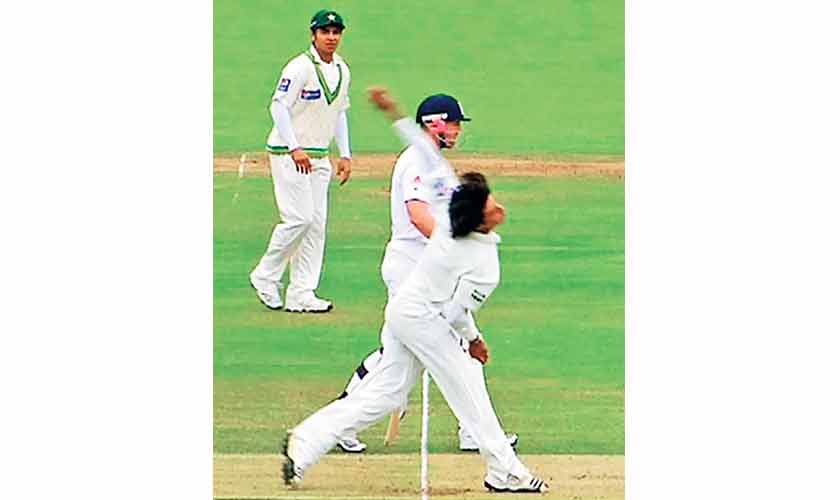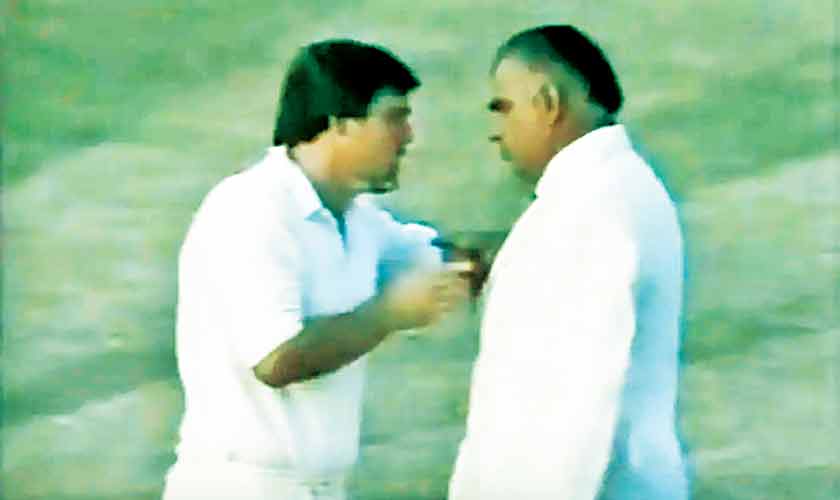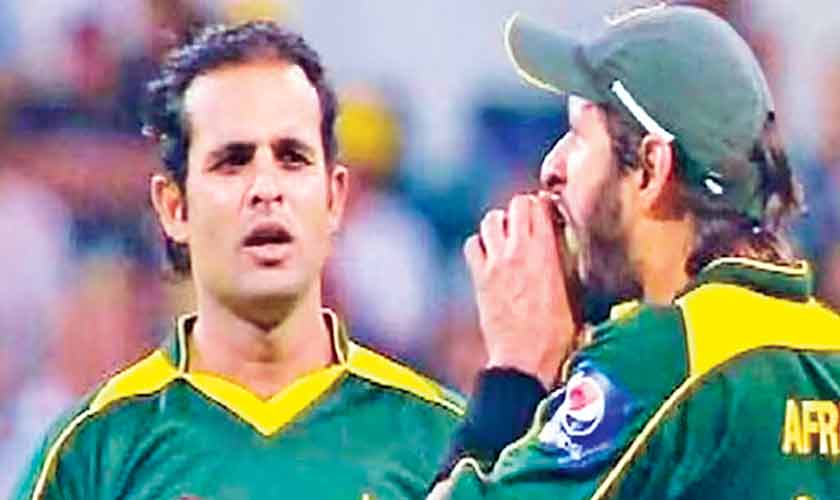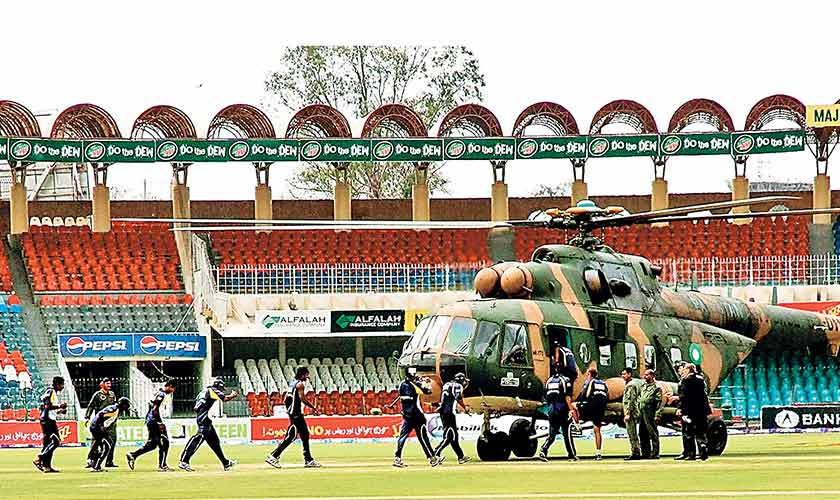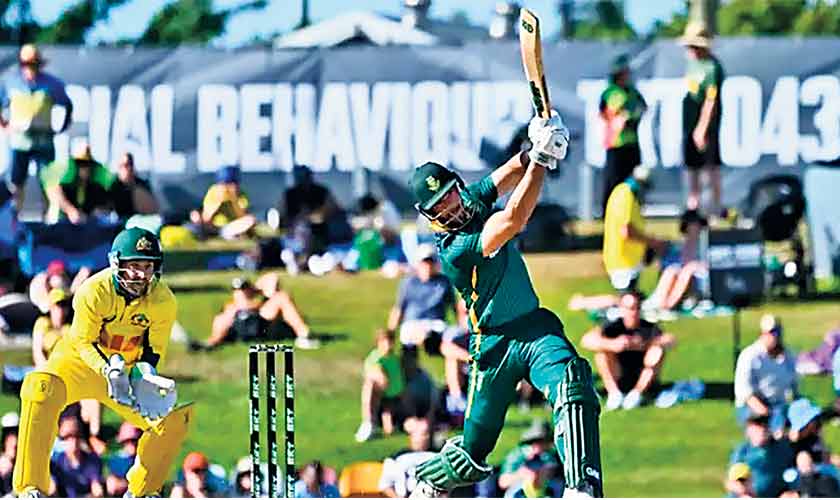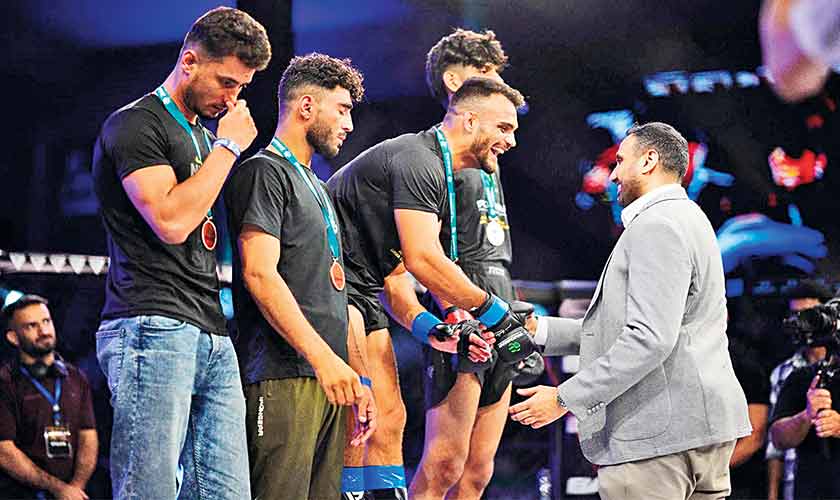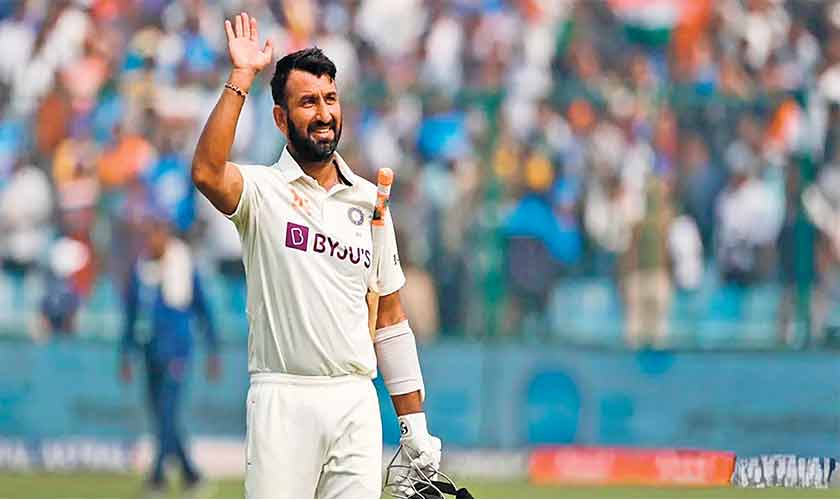In Pakistan cricket is more than just a game. It is almost a national obsession that brings together people from diverse backgrounds to create a shared passion that transcends internal divisions and divergent outlooks.
Victories on the cricket field are often celebrated as national triumphs, fostering a sense of collective pride and belonging. Equally, defeats are portrayed as major calamities and disappointments that invoke much invective and dismay.
In a sport that generates so much emotion, it is only natural to have heated debates on practically every aspect of the game. Sadly, however, apart from valid discussions and arguments on strategy and performance, Pakistan cricket has been also riddled with regular controversies almost from its very inception.
The 1954 England tour captaincy
controversy
At the time of Pakistan’s independence the national side was captained by Mian Mohammad Saeed, an able batsman and a popular leader who, in November 1948, led the team with considerable distinction in an unofficial Test against a full strength visiting West Indian side.
However, the following year Pakistan were comprehensively defeated at home by a Commonwealth Eleven leading to calls for a change of leadership. An English team under Nigel Howard was due to visit Pakistan in the winter of 1951 and it was an opportunity for Pakistan to press its case for full membership of the ICC and with it the right to play Test cricket. Justice AR Cornelius, the chief of the selection committee, wrote to Abdul Hafeez Kardar, who was then playing in England , offering him the captaincy of the national side.
Pakistan beat the MCC side (as touring English teams were then known) in an unofficial Test in Karachi and was granted full membership of ICC soon after. Kardar, then, also captained Pakistan on its inaugural tour of India in the winter of 1952 winning considerable praise for his leadership and the team’s performance.
Just when everything appeared settled, came Pakistan’s first cricket controversy. Pakistan was due to tour England for a full Test series in 1954. Mian Mohammad Saeed hadn’t reconciled himself to the loss of the captaincy and began to gather support for being reinstated as the skipper for this tour. He found a powerful ally in Syed Fida Hassan, the Chief Secretary of the Punjab and an important bureaucrat.
According to Kardar himself in his book ‘Memoirs of an all-rounder’ Mian Mohammad Saeed had the backing of a large majority of the BCCP, forcing AHK to resort to desperate measures. On the advice of Group Captain Cheema, the secretary of the BCCP, Kardar met the defense secretary Iskander Mirza, who after listening to AHK assured him that the team would neither be issued passports nor given foreign exchange unless Kardar was the captain. This settled the matter. To assuage any hurt feelings Fida Hassan was appointed as the team’s manager for the tour. Pakistan cricket’s first controversy had been tactfully resolved.
The Idrees Baig episode
In February 1956 the touring MCC A team was playing an unofficial Test against Pakistan at the Peshawar Club ground. At the end of the third day Pakistan were just 18 runs away from victory. Some of the MCC players were unhappy with some umpiring decisions, especially those by one of the umpires Idrees Baig and that evening they decided to play a prank on him. Wearing masks they abducted Baig from the Services Hotel (re-named as the Greens Hotel in 1959-60) where he was staying, and transported him in a ‘tonga’ to the Dean’s hotel where the English team was housed. He was then taken to the vice captain Billy Sutcliffe’s room and drenched with water.
Baig complained and an emergency meeting between the managements of the two teams took place. The MCC initially refused to accept that they were wrong, insisting that this was just a minor practical joke. It was only when the BCCP Secretary Group Captain Cheema threatened to send the MCC team home, that they accepted their mistake and apologised. The President of the MCC, Field Marshal Alexander, also realised the gravity of the situation and sent a formal apology to the Governor General of Pakistan, Iskander Mirza, who was also the President of the BCCP. These two men had served together in the British army and the matter was resolved, allowing the tour to continue.
The Jahangir Khan Report
At the conclusion of Pakistan’s tour of India in 1960-61, which resulted in five drawn Tests, the team manager Dr. Jahangir Khan sent a scathing report to the BCCP, that was severely critical of the behavior of some senior players, particularly the captain Fazal Mahmood and ace batsman Hanif Mohammad. Fazal was accused of dressing up and disappearing every evening at 5.30 pm, showing no interest after this hour in the team that he was leading. Hanif was held guilty of being late on a regular basis and special messengers had to be sent to fetch him to the ground and for functions that the team attended. Fazal was sacked after this tour and both he and Hanif were fined half their bonus money for the tour. Other accused players got off with a severe reprimand.
The Javed Burki Affair
Following Pakistan’s 1-0 defeat in the home series versus England in 1961-62, the captain Imtiaz Ahmed was removed from his post and Javed Burki, an untested twenty three year old with no real captaincy experience, was instated as the team’s leader for the 1962 tour of England ahead of more deserving candidates. JB was the son of Lt Gen Wajid Ali Burki, a key associate of President Ayub Khan and one of the prime personalities of the Martial Law regime. The general opinion was that this appointment owed more to lineage rather than merit. Burki proved to be a weak and indifferent leader and the Pakistan team had a disastrous tour, being routed 4-0 in the five Test series. Not surprisingly Burki was relieved of the captaincy after this debacle and the reins were handed over to Hanif Mohammad.
The mid-tour expulsion of Saeed Ahmed and Mohammad Ilyas
On their 1972-73 tour of Australia a strong Pakistani side was defeated 3-0 despite holding a first innings lead in two of the three Test matches. Before the team proceeded from Australia to New Zealand for another three Test series, the management decided to send two players home for disciplinary reasons. Saeed Ahmed was accused of feigning ill health to opt out of the team for the third Test at Sydney where he had been asked to open the batting and was reluctant to do so as he did not wish to face Lillee with the new ball on a green-top. On his return to Pakistan Saeed was served a life ban by the executive committee of the BCCP.
Mohammad Ilyas was officially considered unfit to play as he still hadn’t recovered from being hit on the face by a bouncer early in the tour. Ilyas, however, has a different story to tell. He says he was punished for an altercation with the management who took his passport, his wallet and his bags when the team left for New Zealand, leaving him stranded in Australia. He slept for a few nights on a Sydney park bench, until he fortuitously bumped into Gamini Goonesena, the former Sri Lankan all rounder who was playing club cricket in Sydney. Goonesena gave him shelter and brought his case to the notice of the authorities. The Australian Prime Minister Gough William, who was a cricket fan, then intervened and arranged for Ilyas to be given $4,000 and an Australian passport.
The players revolt against Kardar
Kardar was known for his autocratic demeanor even when he was the captain of the national side. On assuming charge of the BCCP in 1972 he proceeded to radically revamp the game’s entire domestic structure. Companies, public corporations, banks and government departments were all brought into the fold and new first-class and one day tournaments were designed for their teams to participate in.
These organisations provided secure full-time jobs with good career prospects for the players and also invested in building stadiums and other facilities.
With these reforms Kardar was confident of support from the players. However, he failed to realise that he was now dealing with cricketers who were very different from the ones he had encountered in his own playing days. Many Pakistani players were engaged in the English county cricket circuit and were subsequently much more assertive and aware of their rights, particularly on matters of finance. Their demands came to the fore when Mushtaq was appointed captain for the home series against New Zealand in 1976. He immediately took up the issue of player remuneration with Kardar and the board. Their Test match allowance had been cut from Rs 1500 to Rs 1000 per match since the last home series against the West Indies the previous year. The players also wanted a daily laundry allowance complaining that they often had to spend their evenings washing their kits.
The New Zealand series was to be followed by a tour of Australia and the West Indies for which the weekly living allowance had been slashed from $35 to $25. Kardar felt that all these cuts and frugality was justified as the board had to spend a lot of money on airfare to bring back the players from England and that the players should consider it an honour to represent the country. When their demands were not met, on the eve of the second Test against New Zealand at Hyderabad, six key players announced that they would boycott the match.
A furious Kardar denounced the six as mercenaries and hastily arranged a new team with Intikhab brought back as captain in place of Mushtaq. The team hotel was crowded with two Pakistan teams for the Test. Frantic overnight negotiations ensued and a deal was reached just forty minutes before the start of the match the next day with the six rebels agreeing to play and the originally selected side restored.
However, the matter wasn’t yet fully over. After the conclusion of the series against New Zealand the players still refused to sign the official contracts for the Australian and West Indies tours as they felt that Kardar had reneged on his commitment to raise the weekly allowance from $25 to $50. Kardar refused to budge and again sacked Mushtaq replacing him once more with the pliant and affable Intikhab. The players approached the President of the Pakistan Sports Board, Abdul Hafeez Pirzada, who took them to meet the Prime Minister ZA Bhutto. ZAB was sympathetic and immediately acceded to the players demands, thereby handing them a big victory. Kardar’s authority had been severely and irreparably dented.
Shakoor Rana – Mike Gatting row
During England’s 1987 tour of Pakistan, in the second Test at Faisalabad, near the end of the second day’s play, the English captain Mike Gatting brought in the off-spinner Eddie Hemmings to bowl the last over of the day to Saleem Malik. Midway through the over Gatting changed his field placings, bringing David Capel in from long leg. Then, as Hemming was running in to bowl, Gatting, who was standing in the slips, signalled to Capel once again. This was noticed by the square leg umpire Shakoor Rana who called for proceedings to be stopped while the other umpire Khizar Hayat declared a dead ball.
When Gatting questioned this decision Shakoor Rana told him that the rules did not allow moving players while a ball was being bowled. Gatting felt that it was permissible as his gesture to Capel had been behind the batsman’s line of vision. A heated and abusive argument took place and when Gatting refused to apologize the umpires did not take the field on the third day. As emotions escalated, the two boards got involved and a brief apology was eventually tendered by the English captain that allowed the game to resume on the fourth day.
Shahid Afridi’s
ball-biting and pitch scuffing incidents
In 2010 during an ODI against Australia at the WACA ground in Perth, the Pakistan captain Shahid Afridi was caught on camera biting the ball. The on-field and third umpires reported the incident to the match referee who handed Afridi a two-match T20 International ban, after he pleaded guilty and apologized for his action.
Earlier, in 2005, in a match against England at Faisalabad Afridi had been seen on camera deliberately scuffing the pitch with his boots. This incident resulted in a one-Test and two-ODI ban for Afridi.
Ball tampering and Test forfeiture
During the fourth day of their fourth Test versus England at the Oval in 2006, the two umpires Darrell Hair and Billy Doctrove, accused the Pakistan team of ball-tampering and awarded England five penalty runs. The Pakistan team, led by Inzamamul Haq, disputed this decision and refused to take the field after the tea break, following which the umpires took the unprecedented step of declaring England winners by forfeiture, the first such decision in cricket’s 130 year history.
Inzamam was subsequently acquitted of a ball-tampering charge while it emerged that Hair had offered to resign from the ICC Elite Umpire Panel in return for a US$500,000 payment. Was this simply poor umpiring judgement or insensitivity or was Hair deliberately courting controversy.
Spot-fixing
One of the saddest days in Pakistan’s cricket history came during their tour of England in 2010 in a Test match at Lord’s. Three key Pakistani players, the captain Salman Butt, Mohammad Asif and the new fast bowling sensation Mohammad Amir were caught in a sting operation involving a tabloid newspaper and a bookmaker. They were shown to be guilty of bowling no-balls at pre-arranged times of the match. The players were banned from the game for periods ranging from 5-10 years and subsequently received prison sentences as well.
Bob Woolmer’s death
The date March 17, 2007 is permanently etched in the minds of those who follow the fortunes of Pakistan’s cricket team. It was the day when they were beaten by cricketing minnows Ireland in the preliminary stages of the 2007 World Cup. Further tragedy befell the team when their coach Bob Woolmer was found dead in his hotel room the following morning.
Woolmer had significant health issues including diabetes and hypertension but the timing and manner of his death led to considerable speculation. There were rumors that he was about to expose the dark side of cricket and reveal its seamy secrets related to match-fixing and bookies and that a cricketing underworld mafia was responsible for his death.
After much confusion and conflicting gossip the medical evidence finally concluded that Woolmer died a natural death from medical causes.
The terrorist attack on the Sri Lankan team
On March 9, 2009, as a bus carrying the Sri Lankan team wound its way to the Gaddafi Stadium in Lahore for the Test underway there, it came under rocket, grenade and gunfire from heavily armed militants. In this terrorist attack eight people died and six were injured and it was only the courage and quick thinking of the driver, who managed to maneuver the bus on flat tyres, that prevented a bigger tragedy.
The consequences included Pakistan’s abolition as a Test cricketing venue for a whole decade. Of all the wounds that different controversies have inflicted on Pakistan cricket this perhaps has been the most grievous cut of them all.
Dr Salman Faridi is a senior surgeon, poet, sports aficionado and an avid reader with a private collection of over 7000 books.
salmanfaridilnh@hotmail.com

